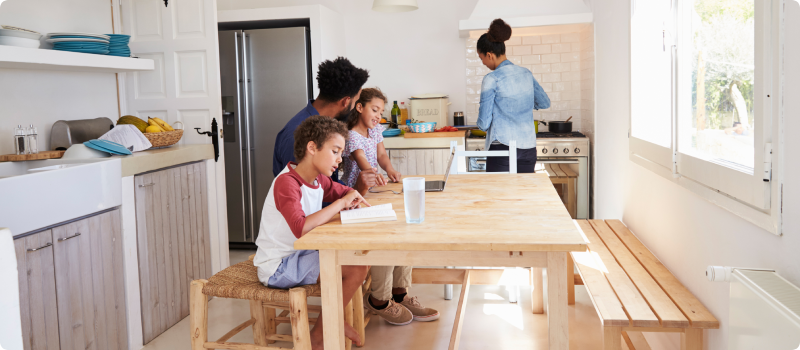
How to save on household expenses and monthly bills
Updated May 3, 2024 . AmFam Team
There’s a lot you can do to control your spending and save more of your hard-earned cash each month. One big key to financial success is to ask how to save money each time you’re spending it. That includes those automatic payments and other expenses that sometimes slip into the background of your finances.
And if you’re wondering how to save money for a house, you can really sock away some extra money if you trim down these monthly payments where you can and aim that surplus cash into a new savings account.
It’s important to look at every bill and expense each month to see if there are ways to cut down on costs — even smaller bills can add up over time. Things like buying a cup of coffee or purchasing lunch every day, sticking to cable instead of cutting the cord and buying name-brand groceries instead of the off-brands label can all cost a lot of money over time.
Take a look at these simple tips for reducing your expenses and building new financial habits that can really help you save you more money.

What are household expenses?
Household expenses are your reoccurring bills, such as utilities and groceries. They don’t typically include occasional purchases like clothes and electronics.
If you’re wondering how to save for a house, trimming your monthly bills may be a great way to start.
Examples of household expenses:
- Payments to credit cards
- Cell phone bills
- Rent or mortgage payments
- Gym membership monthly dues
- Home insurance payments
- Grocery store expenses
- Utility bills
- Cable and internet
- Car insurance payments
- Taxes paid monthly
- Cable TV and entertainment expenses
How to budget and save each month
There are many ways to cut household expenses and save each month. A good place to start is to carefully review your recent checking account statements and lean on technology to help uncover spending habits. This can allow you to better understand how your personal finances are shifting from month to month. And most importantly, you’ll begin to see patterns in the way you’re spending.
Here are a few small, easy changes you can make to start reducing your monthly expenses today:

1. Download a personal finance app
Leverage the powerful banking tech available today and learn how to budget and save each month in no time at all. Here’s a big bonus: many of these same apps can help you achieve a higher credit rating, too.
Some are free, others require a monthly subscription — but as they say, “knowledge is power.” And these apps know how to save more money because they analyze spending patterns in your checking account. And you'll also get graphs that visually explain where your money's going every month, which can be a real eye-opener.
These apps are worth your consideration:
- You Need a Budget (YNAB) (Opens in a new tab) – Frequently wins the top spot for best overall budgeting app
- Mint (Opens in a new tab) – Loved for insights on lowering interest rates on existing loans and credit cards — and that it’s free
- Simplifi by Quicken (Opens in a new tab) — Named Best Budgeting Apps and Tools by New York Times’ Wirecutter
- PocketGuard (Opens in a new tab) — Great for gaining control over binge purchases and taking control of personal finances
2. Take on meal planning and cook at home
The simple act of cooking at home can save you a lot. Think about those expensive restaurant bills with appetizers, drinks, the main course, dessert and tip — all of that adds up quickly. By simply preparing your meals at home, you’re already winning!

3. Use shopping lists
Planning your meals isn’t just about making a weekly menu — it can help you learn how to save money on groceries and spare you the desire for impulse purchases. With a shopping list, you know exactly what you need to buy for meals each week, so you can be more disciplined. Shopping lists can also help you prepare lunches — instead of buying one every day.
4. Cancel cable TV and trim entertainment costs
Long commercial breaks, inconvenient broadcasting schedules and it’s still mostly reruns? Cut the cord and end your cable contract instead of renewing. You can get free local channels with a digital antenna, and you can pick up a la carte streaming services to watch your favorite shows for a fraction of the monthly price of cable.
5. Reduce your electricity usage
We all know to turn off the lights when we leave a room, but did you know that unplugging your always-on appliances when you’re not using them can save you money? You may have heard of something called vampire energy — electricity consumed when an object isn’t in use but is still plugged into an outlet. Your microwave, desktop PC and more are all pulling money out of your wallet, even when they’re switched off or not being used.
Wondering how to save money on electric bills? Try putting into practice these money-saving tips:
- Swap out incandescent light bulbs with high-efficiency LEDs
- Use appliances like your dishwasher and electric dryer at night — when rates can be lower
- Enroll in time-of-use and peak time savings plans with your electric utility
- Use power strips to keep electronics from consuming phantom loads when they’re not in use

6. Invest in smart home tech and save
Another great way to save on utility bills is to pick up a smart thermostat that allows you to adjust the temperature — even when you’re not home. The companion app can learn your “home and away” habits and predict when you’ll be arriving. They’ll make adjustments to your heating and cooling schedule to optimize efficiency and still keep your home comfortable during regular at-home home hours.
The simple act of putting your thermostat on a schedule can save you a lot of money. If your air conditioner runs even when you’re not home, you could be losing out on extra cash. If you’re wondering how to save money for a car, trimming energy expenses is a great way to build capital over several months. In the colder seasons, an unoccupied house can safely sit at 65 degrees, so set the thermostat to warm up the house 30 minutes before you get home instead of having it run all day.
Best of all, when paired with other smart home tech, your new thermostat can help to score you a smart home discount.

7. Purchase refurbished and used items
Not everything needs to be bought brand new. Instead of buying the latest new appliances or electronics, check listings on sites like Craigslist or eBay for used or refurbished versions in good condition. When buying used, you should always make sure what you’re getting is of good quality, so request an inspection or assessment by either yourself or a professional you trust.
You can also save a lot on household expenses by shopping at thrift stores. Buying clean, used clothes, books, dishware and more helps keep these items out of landfills and helps you hold onto more money — month after month.
How to save on your insurance premiums
We offer several ways to help you protect your dreams for less. Bundling your home and auto insurance, applying for our usage-based car insurance program and taking advantage of our smart home discounts are excellent savings options for qualifying customers.
Connect with your American Family Insurance agent to learn about our discounts today.
This article is for informational purposes only and based on information that is widely available. We are not responsible for the content of any third-party sites that may be linked in this article.
American Family Mutual Insurance Company, S.I. nor its operating companies approve or endorse the products or services of any third parties that are referenced within this article. This article is for informational purposes only and based on information that is widely available. This information does not, and is not intended to, constitute financial advice. We do not make any guarantees or promise any results based on this information.

